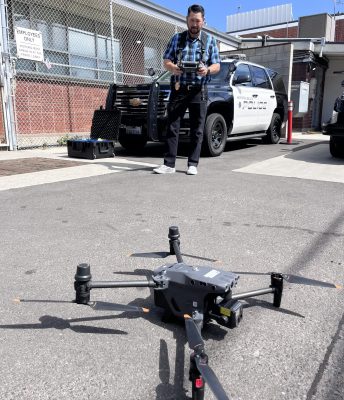
The Manhattan Beach City Council approved a program to purchase streetlights from Southern California Edison at its Tuesday night meeting, a move that officials hope could net the city revenue in years to come.
The unanimous vote approves a purchase and sale agreement with Edison, and will allow the city to collect important information from the utility about the poles eligible to be purchased. In the interim, Edison will submit the purchase plan for approval to the California Public Utilities Commission (PUC).
Acquiring 927 poles from the utility would cost the city $813,738, according to a staff report. But Public Works Director Stephanie Katsouleas said that acquiring the poles would save the city about $87,500 per year in maintenance costs.
Acquiring the poles would also open up a new, potentially highly lucrative revenue source to the city: the ability to lease the poles to communications companies looking for real estate for wireless-service enhancing devices and other “smart pole” technology. Currently, the city has received 16 applications from AT&T to install the smart-pole technology in the city. Although still speculative, some estimates indicate that these leases could generate $300,000 a year or more in revenue.
Municipalities only recently gained the ability to purchase the poles and take advantage of the revenue to be gained from leasing them to communications companies. A state-brokered consent decree in 2010 forced Edison to give cities the option to purchase the poles, but set a strict series of deadlines for cities wishing to do so. State regulations, Katsouleas said, mean the time window to acquire the poles for leasing is rapidly closing, prompting the need for quick action from the council.
“If we don’t purchase the poles now, we don’t preserve our right to add these new technologies,” she said. “We would be financially irresponsible not to take advantage of it.”
Councilman Wayne Powell said he appreciated the prospect of added revenue, but urged the city to pursue regulations governing just how much space items on the leased poles could occupy, out of concern that they block scenic vistas.
“We need to have some kind of policy in effect to make sure we don’t start going ape crazy,” Powell said.
Although acquiring the poles creates projected maintenance savings and provides the opportunity for leases to technology companies, it does create some added costs. Specifically, once the city acquires the poles, it would be their responsibility to replace them, rather than Edison’s.
The city plans to set aside a portion of the savings each year to pay for future replacement costs. But Councilman Tony D’Errico pointed out that, if the city had to replace a large number of poles all at once, it could create a cash flow problem for the city.
“Which poles have to be replaced, and when?” D’Errico asked.
The poles have a lifespan of up to 70 years, but it is not clear how old the poles that the city would be acquiring are, Katsouleas said. That information, and the date of probable replacement, would not be available until after the city submits the purchase agreement approved Tuesday night.
Finance Director Bruce Moe said that, with this information in hand, the city would evaluate the risk of pole replacement impacting cash flow before approval went to the PUC.
Although the city was not required to purchase poles in order to do so, the council also approved a retrofit of the street lights they were acquiring with LED lamps. Converting the lights, which currently run on high-pressure sodium vapor, will cost $381,189, but the lower energy consumption of LED lights will lower the city’s carbon footprint, and is expected to save the city $42,000 per year in electricity costs.









